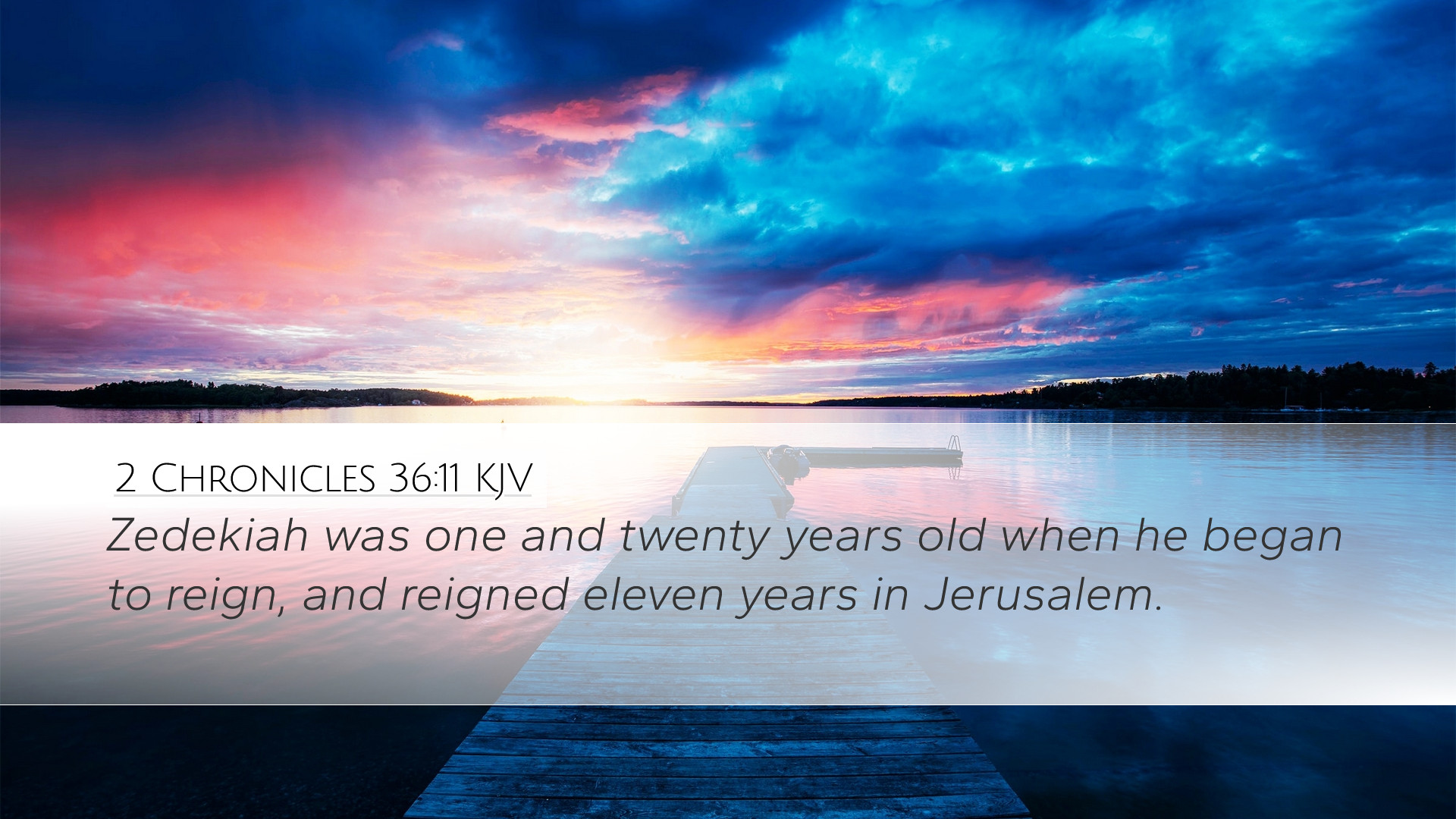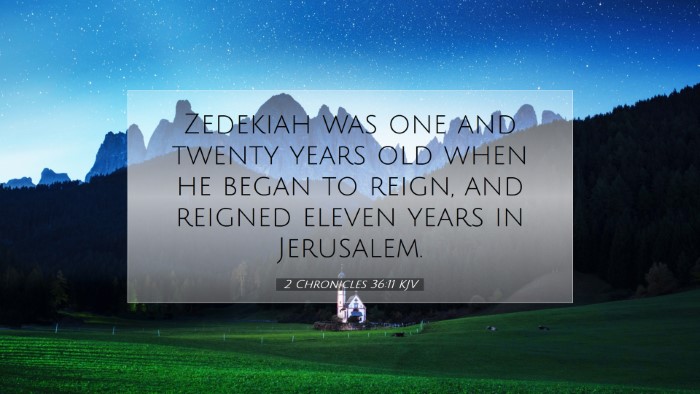2 Chronicles 36:11 - Commentary Summary
Verse: "Zedekiah was one and twenty years old when he began to reign, and he reigned eleven years in Jerusalem."
Introduction
2 Chronicles 36:11 provides a brief historical account of King Zedekiah, highlighting his age at the ascendance to the throne and the duration of his reign. This commentary explores the significance of Zedekiah's reign in the broader context of the history of Judah, drawing from insights provided by esteemed commentaries from Matthew Henry, Albert Barnes, and Adam Clarke.
Zedekiah’s Age and Reign
Matthew Henry observes that Zedekiah, being only twenty-one years old at the beginning of his reign, illustrates a time of vulnerability and inexperience in leadership. His youth accentuates the chaotic political environment of the period in which he ruled. Henry suggests that Zedekiah's lack of maturity and discernment was detrimental to the nation, particularly in resisting Babylonian authority.
Albert Barnes expands on this notion by contextualizing Zedekiah within the backdrop of the Babylonian exile. He notes that Zedekiah was placed on the throne as a puppet king under Nebuchadnezzar. His reign reflects the larger themes of submission and rebellion against divine authority. Barnes emphasizes the importance of understanding Zedekiah's reign not merely as a historical footnote but as a fulfillment of prophetic warnings regarding disobedience and idolatry in Israel.
The Eleven-Year Reign
Adam Clarke elaborates on the eleven years of Zedekiah's reign as emblematic of a turbulent and pivotal time for Jerusalem. The eleven years witnessed significant moral decline and national turmoil, leading to catastrophic consequences. Clarke further indicates that Zedekiah's inability to heed prophetic counsel contributed to the downfall of Jerusalem, culminating in the destruction of the Temple and the exile of the people.
This duration also serves as a symbolic representation of a generation that failed to turn back to God, which Clarke details through the lens of the captivity narrative. The emphasis on the specific timeframe underlines God's patience juxtaposed with impending judgment, a theme prevalent in prophetic literature.
The Theological Implications
Divine Sovereignty and Human Responsibility
The account of Zedekiah in 2 Chronicles 36:11 raises essential questions about divine sovereignty and human responsibility. Theologians have long debated the tension between God's ultimate control over history and the capacity of individuals to make moral choices. Matthew Henry asserts that while a ruler is appointed by God, the moral choices made by that ruler have real and significant consequences. This duality is exemplified in Zedekiah's reign, where divine providence interacts with human folly.
Prophetic Fulfillment
Albert Barnes points out that the events during Zedekiah’s rule are marked by the prophecies of Jeremiah. The king’s refusal to heed God’s warnings serves as a fulfillment of prophecy, showcasing the seriousness of ignoring divine counsel.
The Warning for Leaders
The reign of Zedekiah serves as a sobering reminder for contemporary leaders, both secular and religious. Adam Clarke highlights that leaders ought to seek wisdom, humility, and divine guidance in their decision-making processes. This historical account encourages modern, God-fearing leaders to prioritize righteousness and justice in their governance.
Lessons for Modern Believers
The Importance of Godly Counsel
Reflecting on Zedekiah's failure to listen to prophetic voices, there emerges a crucial lesson for believers today regarding the necessity of seeking godly counsel and guidance. Matthew Henry advises that disregarding spiritual wisdom often leads to dire consequences, as seen in the king's life.
Staying Faithful Amidst Adversity
The narrative of Zedekiah also depicts the trials faced by God’s people during turbulent times. Albert Barnes reinforces the belief that while Zedekiah's reign ended poorly, the faithful remnant should remain steadfast in belief and practice, trusting in God's ultimate plan for restoration.
Seeking God in Leadership
The challenges inherent in leadership are echoed in Zedekiah's story. Adam Clarke emphasizes that leaders must cultivate a dependence on prayer and fidelity to God’s word, steering clear of the pitfalls of pride and disobedience that characterized Zedekiah’s reign.
Conclusion
In summary, 2 Chronicles 36:11 encapsulates critical themes for understanding the interplay of leadership, prophecy, and divine judgment within the context of ancient Judah. The reflections from public domain commentaries enrich our understanding of Zedekiah’s reign not just as historical data, but as spiritual lessons applicable to both leaders and laypeople today. Learning from Zedekiah’s mistakes may inspire contemporary believers to seek godly wisdom, prioritize faithfulness, and recognize the importance of heeding prophetic warnings in their personal and communal lives.


